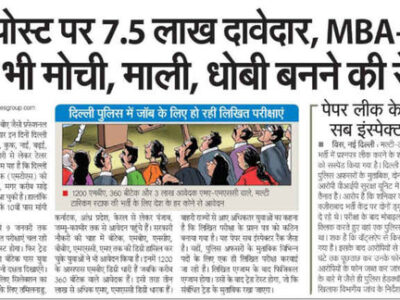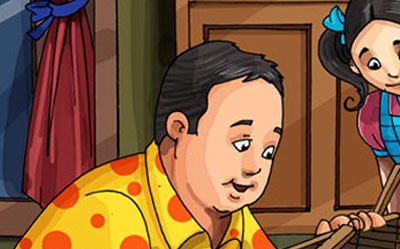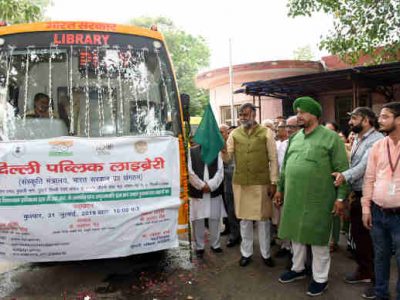
Education Dilemma: Let Us Save the Lives of Our School Children
Education Dilemma: Let Us Save the Lives of Our School Children
Today, the Indian government boasts that India is a nation of the young people. But the government does not realize that in the absence of right education, these young people are like time bombs.
By Rakesh Raman
As the school education in India is already on its deathbed, it needs some immediate remedial treatment to stay alive.
Although the government bosses are aware of this fact, they have not yet taken any concrete steps to bring the necessary reforms to the education policy framework.
The President of India, Pranab Mukherjee, did not mince his words to say recently that the Indian education system needs immediate improvement.
The President said it was a contradiction between our aspirations to occupy a place at the high table of the comity of nations and the reality of education in the country that motivated him to draw attention to the need to improve quality of education in the country.
Mukherjee was particularly referring to the poor quality of higher education in India. However, the education standards are equally bad in the primary and secondary school education in the country.
As a result, the unemployment situation is going from bad to worse – which is also reflected in the worsening Human Development Index (HDI) of India that falls at a poor rank of 130 in the world.
Moreover, a new ‘Pearson Voice of Teacher Survey 2015′ reveals that Indian students may be educated but they are not employment-ready.
In the survey, 52% of the respondents believe that India’s Education Assessment Framework lacks specific action points for teachers and parents to enable holistic education.
[ क्या आप भी अपने बच्चों की पढ़ाई को लेकर परेशान हैं? ]
In the recently released Draft National Education Policy (NEP), 2016, the Government of India has also admitted that there are many flaws in the Indian education system.
So, what should we do to improve the quality of education particularly in Indian government and private schools which are supposed to build the foundation for higher education of students?
Here is a list of 13 remedial steps that need to be taken to achieve the desired results.
1. Primary Curriculum
The curriculum for primary education needs to be serially structured with focus on arithmetic, statistics, computer technology, local language (say, Hindi), and English.
Other subjects such as general science, social studies, and general knowledge should be treated as secondary subjects on which primary schools should not spend more than 20% of the total teaching time.
2. Education Streams
The students who clear the primary schooling should be offered to join three different education streams:
1. STEM (Science, Technology, Engineering, Math)
2. Management
3. Trade and Commerce
Students should be allowed to choose any of the these streams depending on their aptitude and performance in an admission test after the primary level.
3. New Syllabuses and Books
The specially designed courses for each stream stated above will run for seven years (Class 6 – 12). Totally new syllabuses need to be created for these courses.
For example, the STEM courses can be further classified into life sciences, information technology, automobile engineering, or math-based microprocessor design.
Similarly, the Management studies can focus on Enterprise Resource Planning (ERP), Human Resource Management, Digital Media Management, and so on.
The Trade and Commerce subjects must include the contemporary financial and economic trends in the local and international markets which are increasingly getting interconnected.
These are just a few examples of the new syllabuses that need to be designed. The idea is to encourage students to apply their education in the new environments keeping in view the employment requirements of the modern world.
Accordingly, all the school books need to be changed as the present books are totally irrelevant and carry unstructured content. Supplementary education, moral education, and soft skills should be integrated with the conventional school education.
4. New Teachers
It is seen that almost all the teachers in government as well as private schools in India are not competent enough to teach in a modern environment.
The existing teachers in the schools should be asked to appear for a specially created teacher eligibility test to know if they can teach the subjects for the revamped syllabuses of different classes.
Only those teachers who clear the test comprehensively should be retained; others should be asked to take voluntary retirement. New teachers’ appointment should also be based on their academic record and performance in the teacher eligibility test. Plus, domain experts should be appointed as teachers.
5. Crackdown on Private Tuitions
Although government rules restrict private tuitions, the business of private tuitions is spreading like an epidemic in India. School teachers, who are not supposed to ask students to take private tuitions, are pushing students into this mud.
If teachers cannot teach students properly in the school classes, why are they being paid salaries? And why are the students who can afford private tuitions being paid monetary allowances in government schools with the assumption that they are poor? School teachers and students must submit affidavits that they will stay away from private tuitions.
The government should declare private tuitions as an illegal trade and carry out a widespread crackdown on private tuition shops most of which are being run by semi-literate people.
The services of those school teachers who ask students to take private tuitions should immediately be terminated. Similarly, the students who take private tuitions should be thrown out of the school. The school education systems cannot improve if the students’ education is dependent on private shops.
6. Role of Parents
Most parents know that the school education is not up to the mark. But when they try to raise their voice against it, they are dissuaded or threatened by school teachers.
The statutory school management committees, which are supposed to have some parents of students as members, exist only on papers. As the voice of the parents goes unheard, the government should create a workable channel through which parents could register their complaints against teachers without any fear.
A proper investigation should be conducted to redress the parents’ grievances and strict action should be taken against erring teachers.
7. Parents’ Awareness
As most Indian parents are uneducated, they don’t understand the meaning of education in their children’s lives. Most parents discontinue their children’s education and push them into low-wage employment or early marriage shackles. Such parents are cruel and treat their children as slaves.
In the absence of educational culture at their homes and because of utterly abusive education system in the government schools of India, most such students keep loitering in dirty streets and fall victim to bad habits such as drug abuse, theft, eve-teasing, scuffles, and so on.

Young children forced by parents to sell eatables outside a school building in New Delhi, India. Photo: Rakesh Raman
Schools should arrange special awareness classes for parents so that they could take care of their children’s education. They should also be taught the family-planning norms so that they should not produce more children who become a burden on the entire society.
8. Class Promotion
It is perhaps the worst practice in schools to promote students to the next class without assessing their performance in exams. If a student is not able to clear the exams of a particular class with at least 50% marks, they should never be sent to the next class. The rule should apply to all students of all classes.
The government should also stop the monetary allowance of those students who fail to clear their exams. Why should the public money be wasted on the students who are not capable to learn?
9. Examination Surveillance
All of us know that the corruption level in all types of exams is increasing in India. The students in Class 10 or Class 12 do not know even the basic arithmetic involving addition, subtraction, etc. They cannot write even in Hindi and their understanding of English is pathetic, as school teachers are not quite competent to teach English.
In other words, the knowledge level of students who clear Class 10 or Class 12 exams is worse than even the primary level.
Then how do such students clear Class 10 or Class 12 exams? This is all because of mass copying in schools allowed by school teachers to show the better performance of schools. If such students are asked to sit again in closely monitored exams, nine out of every ten students will fail.
So, the government should make it mandatory to hold all school examinations under surveillance cameras which could catch the cheating students and corrupt teachers who help students copy and cheat. Special security personnel should also be deployed in examination halls. Then only the deserving students would be able to clear the exams.
10. Special Education
An estimated six out of every ten students in schools are slow learners. Although they may not be physically challenged, but they are mentally and emotionally challenged mainly because of their vulnerable socio-economic conditions.
Teachers can easily identify such students from their behaviour and performance in class. Such students cannot learn even simple topics such as English alphabet, basic arithmetic including addition, subtraction, etc. Moreover, they cannot sit properly in the class and hesitate when asked to speak.
Schools should create separate special education infrastructure in schools for such students and they should not be taught along with normal students, as it will hamper the pace of teaching.
11. Job Market
In the increasingly shrinking job market of India, it has become almost impossible even for people with academic degrees to get jobs. It does not mean that there are no jobs at all.
In fact, there are many jobs in the private companies, but most degree holders do not fulfill the job requirements. In other words, the degree holders are not qualified enough to handle modern-day jobs because of the poor quality of education in schools and colleges.
In order to increase the employability of students, the schools must coordinate regularly with companies in different industrial segments such as banking & finance, manufacturing, telecom services, etc. to make dynamic syllabuses based on the skills required for different modern jobs. The skill-based education should begin at the school level.
12. Career Counseling
The schools should have dedicated counseling departments with specially trained counselors who could guide the students at every step of the education lifecycle.
The counselors should be able to tell the difference between a job and education-based career to students and chalk out the complete career path for students.
13. Literacy Definition
The prevailing definition of literacy in India is totally false and misleading. A person is considered literate or educated if they can read, write, and do basic arithmetic in day-to-day life.
But this education is of no use. A person should be considered educated if they can get a respectable job with their education and progress in their career with the help of that education.
Among other academic qualities, such an educated person would have a formal certification equivalent to at least the bachelor’s degree or graduation degree.
According to the United Nations Educational, Scientific and Cultural Organisation (UNESCO) “literacy involves a continuum of learning in enabling individuals to achieve their goals, to develop their knowledge and potential, and to participate fully in their community and wider society.”
That is literacy. So, India should accordingly change its archaic definition of literacy and develop a realistic definition. By the new definition, in all probability, the number of educated persons in India will not be more than 5% of the total population.
While school education should only be treated as a foundation for higher education, the persons who have completed only the school education must be bracketed with uneducated people.
– – –
Today, the Indian government boasts that India is a nation of the young people with more than 54% of its 1.3 billion population below the age of 25 years.
But the government does not realize that in the absence of right education, these young people are like time bombs. They will not be able to get the right career without the right education. Then in desperation today’s young people will become tomorrow’s criminals and bring disaster for India.
It is, therefore, an imperative to immediately revamp the entire school education system of India to save the lives of millions of children by giving them the right education. Will it happen?
By Rakesh Raman, who is the managing editor of RMN Company and runs free schools for poor children under his NGO – RMN Foundation.





